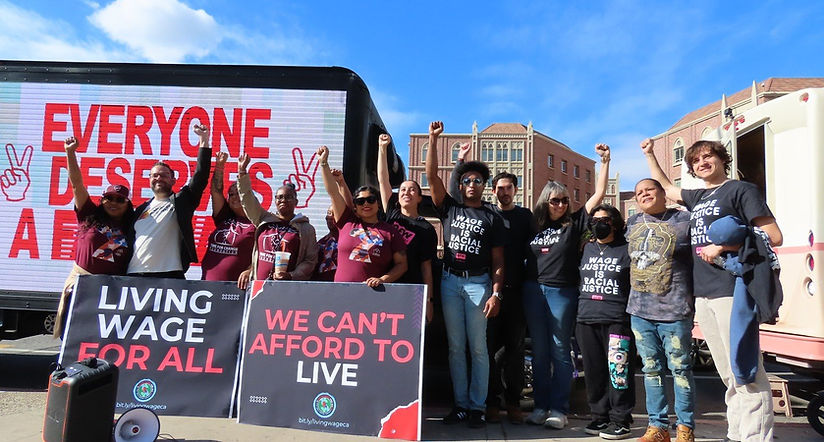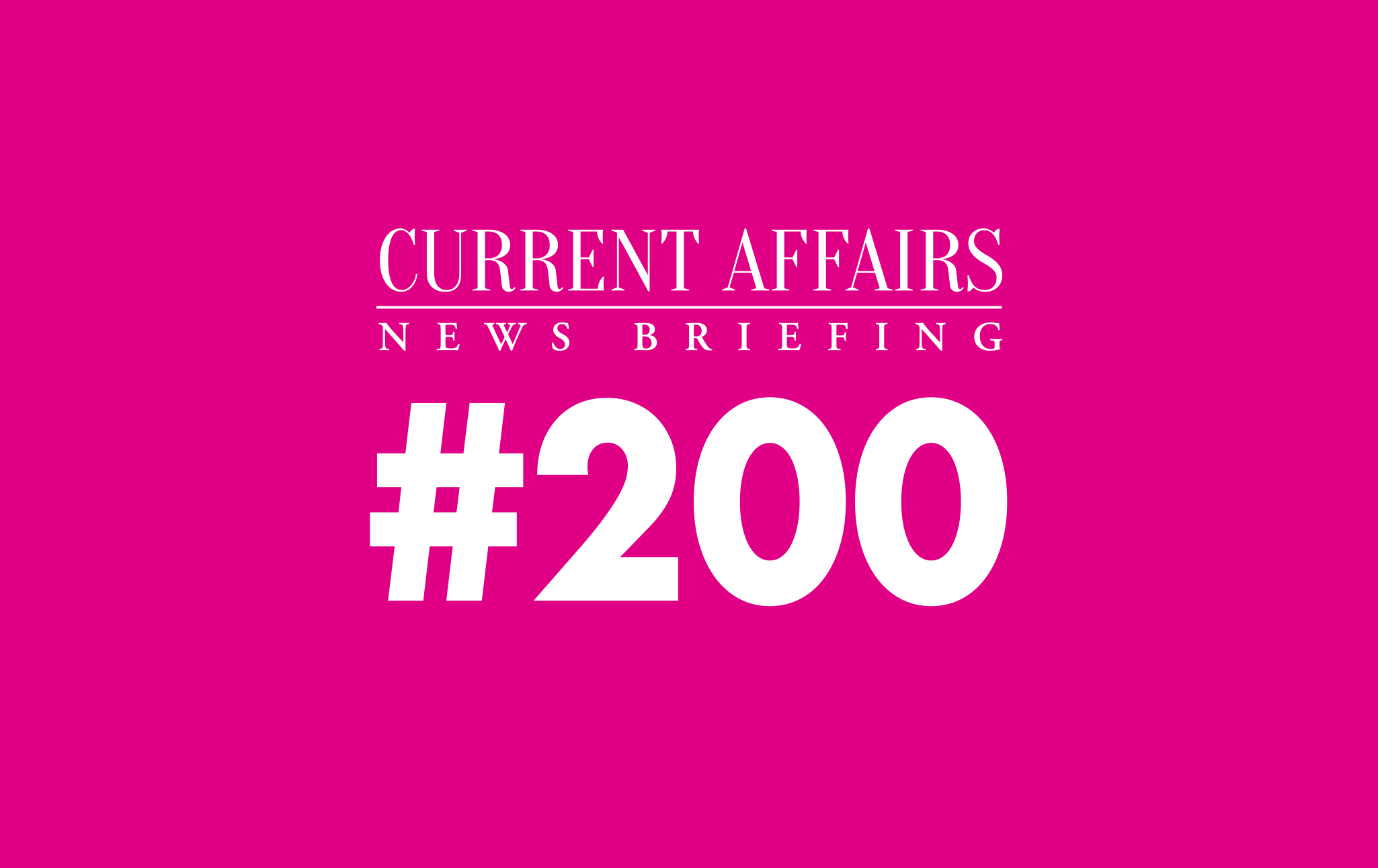Featuring: The latest on DC restaurant workers’ wages, voting rights shenanigans, sweatshop defenders, the Pyongyang Times, and something that might be a bug...
Today’s edition of the Current Affairs News Briefing is a very special one. It’s #200! When we started the News Briefing service back in June 2023, we couldn’t have dreamed that so many people would embrace it as part of their weekly routine. Now, more than two years later, it’s your subscriptions and suggestions that have made it all possible. For those of you who haven’t yet gotten aboard, there’s never been a better time. Every week, we scour publications around the world to bring you interesting and important news stories you won’t find in the corporate media, with the usual Current Affairs mix of deep analysis, wit, and whimsy. Our lovely email subscribers got Briefing #200 yesterday, straight to their inboxes—but as a special anniversary treat, we’re also making it public. Check it out, and if you like what you see, subscribe today! We’re with you all the way down News Street. ❧ DC Restaurant Workers Fight for a Minimum Wage For years the District of Columbia, like states across the U.S., allowed servers, bartenders, and other tipped employees to be paid less than minimum wage, with the logic that tips would supplement their paychecks to above minimum standards. That two-tier salary scale has existed in the U.S. since the sixties. The last time the tipped employee minimum wage was raised was in 1996, when it was set to $2.13 an hour. Proponents of the tipped minimum wage (who tend to be restaurant owners that benefit from not paying employees a full salary) claim that tipping culture allows servers to make more money than they would on a fixed salary. The data doesn’t back that up. Tipped employees are significantly likelier than non-tipped employees to be below the poverty line. They are more likely to depend on government benefits like SNAP (food stamps). (One strike against Trump’s “no taxes on tips” proposal: one third of tipped employees are so poor they don’t even make enough money to pay income taxes.) Tipping exacerbates preexisting inequality—studies have found that Black servers receive lower tips than their white counterparts. And besides, there’s no rule that says you can’t give someone money to thank them for their work unless they make less than $3 an hour. In DC, tipped employees and voters won an equal minimum wage in 2023 with the passage of Initiative 82. Voters in DC decided by a 50-point margin to require restaurants to pay tipped employees hourly rates equal to non-tipped employees. But last week, the DC Council undermined voters’ will by watering down I-82. Restaurants will now only have to pay workers up to 75 percent of the minimum wage, in a process where the tipped minimum wage will gradually rise until 2034. In the short run, this means workers will simply make less money. But unions and other activist organizations are already successfully fighting back. We wrote in a June News Briefing about the organizers who successfully got dozens of prominent congressional Democrats to boycott premier DC restaurants. Their work is still ongoing, and they have more high-profile personalities on their side. The American Prospect profiled Representative Greg Casar last week while he was at a rally with DC restaurant employees protesting a union-busting owner. He said, quite presciently, “we need more congressmen and -women who feel more comfortable marching into a fancy D.C. restaurant with a union than mingling inside of one with lobbyists.” ❧ Churches are now allowed to endorse candidates.The IRS filed a court document last month stating that it would stop enforcing a 1954 tax code provision that prevented nonprofits from intervening in political campaigns. For years, Republican politicians hoped that allowing churches to endorse and donate to candidates would give them a fundraising edge. Now, they’ll get to try. And knowing them, Democrats will likely respond to the move by emailing, “URGENT: Donate $15 And We’ll Match With One Indulgence.” ❧ The Oklahoma State Superintendent who called teachers “spreaders of pornography” was reportedly caught spreading pornography during work meetings.Ryan Walters is the Oklahoma official responsible for “bringing the Christian bible back to every classroom” and opening the country’s first publicly funded religious charter school. But the Oklahoma City Sheriff's office is now investigating him for an incident where, according to two school board members who were there, he accidentally showed porn on a TV during a meeting. It’s a reminder of the age-old rule: If your boss talksaboutpornallthetime, he is probably watching porn at work. ❧ Two federal judges have retracted error-filled, AI-generated rulings.Judges in New Jersey and Mississippi were forced to retract decisions after attorneys pointed out rampant errors likely generated by AI. The rulings misstated the names of the plaintiff and defendant and cited case law that didn’t exist. But considering what “Grok” and other AIs have been up to lately, the judges are lucky theirs didn’t go on a long tangent about Boer genocide. ❧ The Baltimore Register of Wills Office spent $200k to produce a TV show. The Register of Wills is the local government office that appoints people to administer deceased people’s estates. It is a boring job: reading wills and giving assets to the intended relatives. But in Baltimore, the elected Register of Wills spent more than a million dollars on media and promotional materials, including $200,000 on producing a TV show that never aired. Possible series titles include “Good Will Hunting” and “The Wolf of Will Street.” This week, we were visited by Current Affairs’ newest office mascots! (Pictured here with Paul the bearded dragon lizard.) Editor-in-chief Nathan J. Robinson (top) and Associate Editor Alex Skopic (bottom) welcome Paul (lizard) ❧ Sweatshops are, in fact, bad. Popular blogger Noah Smith is among the many centrist pundits who appreciate the fine art of sweatshops. He, Matt Yglesias, and others have used events of mass tragedy and death as an excuse to discuss why sweatshops, actually, are good. We at the News Briefing want to take a look at why they’re wrong, and why they keep being wrong at the worst times. Smith’s article, published this week, is a great example of the defending-sweatshop phenomenon. It all began, not with sweatshops, but with perhaps the exact opposite topic: Sydney Sweeney. Her recent controversial ad for American Eagle prompted a tweet from fashion blogger and Twitter poster Derek Guy about how American Eagle uses sweatshop labor in Jordan. In 2023, a Bangladeshi migrant committed suicide in a Jordanian factory that supplies American Eagle after being subjected to sixteen-hour workdays, seven days a week, and having her passport withheld by her employer. Here’s how Smith summarizes his desire to comment on the issue: “On one hand, yes, I think it’s good to divert attention away from endless, pointless social media race wars.” However, he notes, Guy “completely ignored the benefits that those garment factories bring to poor countries.” Sweatshops, he says, bring jobs (however dangerous) and wages (however low) that are not otherwise available. People wouldn’t take the jobs if they weren’t their best option, and besides, there’s no other path to economic growth. There’s many arguments to be made about Smith’s empirical claims about what does and doesn’t get countries out of poverty. But for the sake of your attention span, we’ll leave those for a non-newsletter format. Broader criticisms still hit home. Smith prioritizes economic “progress” and “growth” and avoids acknowledging the practicalities that make progress happen. Companies don’t suddenly begin paying workers higher wages when given the chance—profit-maximizing desires lead them to pay as little as they can manage while still retaining sufficient staff. Indeed, it is well within American Eagle’s ability to improve working conditions in Jordanian factories and pay workers a higher wage, and to invest in the technology in Jordan to make that possible. We know this because it already happened here. Activists’ demands to improve factory conditions are how we got clean, safe workplaces in the U.S. and Europe. The process can and should be continued worldwide, so no person has to risk their life for the shirt on someone else’s back. And Smith agrees with this! “[Guy’s] preferred solution to the problems—activism to force factories in poor countries to raise wages and improve working conditions—might be the right thing to do anyway.” But then is his “take” a reaction to progressive ideas about reforming sweatshops? No. It’s a reaction to progressives who “are way too dismissive of the economic benefits of sweatshops.” Take how Smith enters the subject. He describes the “attention-seeking TikTokers” who “call Sydney Sweeney a Nazi,” describing how “sweatshops are bad” is just one of those things “that American progressives are supposed to believe,” and then argues that those leftists are wrong. It’s strange to frame the piece in opposition to leftism when sweatshops are deeply unpopular generally because of (to quote Smith) “a very reasonable disgust at the sort of working-conditions that prevail in sweatshops.” It’s like being angry at Mothers Against Drunk Driving for not mentioning in their advertisements the role of the automobile and the liquor industry in boosting the United States’s GDP. (But, of course, having an appreciation for the reasons why Dads, Sisters, and Cousins Against Drunk Driving might object.) Intellectually incoherent, ethically depraved. For more on the horrors of sweatshop labor, check out this interview with fashion journalist Alyssa Hardy, author of Worn Out: How Our Clothes Cover Up Fashion’s Sins. This Noah Smith, so far as we can tell, has never blogged about labor conditions in Bangladesh, much less defended sweatshops. Instead, he makes jaunty (if somewhat generic) country music. Be more like Noah Smith, and less like Noah Smith. ❧ Pakistan is running out of water.Pakistan’s water woes are well-known; the country was battered by floods in 2024 and 2025. But along with too much water at times, the world’s fifth most populous country also faces the existential threat of running out of water entirely. Climate change has dried up groundwater and made monsoons erratic, keeping Pakistan from being able to manage a constant supply of clean water. At the same time, India has threatened to cut Pakistan off from its largest water source, the Indus river. ❧ Krill killing has concluded. Officials suspended krill fishing off the coast of Antarctica after the fishery fished more krill than allowed. Krill fishing exploded after the international organization governing krill fishing failed to renew a management plan to govern where krill can be caught. Fishermen are frustrated by the ruling, but krill could not be reached for comment. ❧ Things are happening in North Korea.We at the Current Affairs stay current on all affairs, even those from news sources we don’t completely trust. That’s why we spend hours every day reading through the Pyongyang Times, the only English-language newspaper from North Korea. The Times is known for its complete tonal whiplash, often pairing fiery denunciations of the U.S., South Korea, and other rivals (“The Scum Should be Completely Annihilated”) with extremely boring stories meant to show that North Korea is a problem-free paradise (“Birthday Spread Sent to Centenarian”). Recent headlines include “Respected Comrade Kim Jong Un has photo taken,” “Many women become persons of meritorious service,” and “U.S. Atrocities of Germ and Chemical Warfare.” There’s also a nice photo of a “Korean Tiger on Mt. Paektu.” Good to know! When the dust settled at the end of the 2025 Supreme Court term, one case was left standing: Louisiana v. Callais. The Court didn’t issue a decision despite having oral argument, instead punting the case to the next term. Now we know why. On Friday, the Court issued a supplemental order asking the parties to argue whether Louisiana’s creation of a second majority-Black voting district violates the Constitution. Here’s why the order is a bleak preview of the next generation of gerrymandering, and the possible death of the Voting Rights Act. In 2024, the Louisiana state legislature had a problem. The state’s previous congressional district map had been ruled unconstitutional because it diluted Black votes (despite the state being almost a third Black, only one of its six districts was majority-Black). But creating an additional majority-Black district would put one of Louisiana’s Republican incumbents in the House (like Mike Johnson and Steve Scalise, the two highest-ranking House Republicans) at risk of losing their seat (or worse, having to appeal to Black voters). The solution was to create this map, with four normal-ish-shaped districts and two comically stretched-out majority-Black districts cutting across the state from Shreveport to New Orleans. You might notice that Shreveport is sliced up so that Mike Johnson’s house is in a safe, almost entirely rural district, while the rest of the city is districted with Baton Rouge, 250 miles away. Image: Democracy Docket Why is this a problem? After the new map was implemented, a group of “non-African American voters” (read: white Republicans) sued, claiming that by using race as a factor to draw the new map, the state had violated the 14th and 15th Amendments. The VRA requires states to take race into consideration to ensure that minorities aren’t discriminated against (or, as in this case, to remedy discrimination). The issue is that using an analysis of race to ensure discrimination against minorities isn’t happening is the same to Court conservatives as actively discriminating against white voters. If the Supreme Court rules that requiring Louisiana to draw a second minority-majority district violates the constitution, the Civil Rights landmark Voting Rights Act would be all but dead. But it wouldn’t be the first time the Court struck down a core provision of the act. In 2013, John Roberts struck down preclearance in Shelby County v. Holder. Prior to 2013, some states with a history of discriminating against minority voters had to have changes to their voting laws cleared by the Department of Justice before they could go into effect. Roberts wrote at the time that preclearance was unconstitutional because “our country has changed” since the era of Jim Crow. Not that much—in the decade since, states have implemented more than 100 voting restrictions, many of which make it more difficult for people of color to vote. The fact is that it’s not possible for Louisiana to do these three things at once: (i) protect incumbents, (ii) draw normal-looking districts, and (iii) respect Black votes. Our bet: the Supreme Court will rule that Mike Johnson’s reelection is more important than the rights of minority voters. There is, in fact, an insect in this picture. This is a group of thorn bugs, known to science as Umbonia crassicornis. As the name suggests, evolution has equipped them with a unique way of avoiding predators: they look exactly like the thorns on a rosebush or bougainvillea, which makes hungry birds and mammals reluctant to get too close. A female thorn bug can lay up to 100 eggs, so they tend to cluster together, just like real thorns. Meanwhile, science can’t confirm or deny the existence of bugs who mimic more modern objects, like TV remotes or toilet paper rolls. They could be all around you right now, and you’d never know! Writing and research by Grady Martin. Editing and additional material by Nathan J. Robinson and Alex Skopic. Header graphic by Cali Traina Blume. This news briefing is a product of Current Affairs Magazine. Subscribe to our gorgeous and informative print edition here, and our delightful podcast here.THANK YOU
For 200 editions!

Here, and ABROAD

Protesters from One Fair Wage on the protest line.

In other news…

This guy, do something creepy? Nah, couldn't be.
CURRENT-EST AFFAIRS
❧ “Jay-Z and the Pitfalls of Black Capitalism,” by Yannick Giovanni Marshall. “On the underappreciated radicalism of a hip-hop legend, and the danger of believing you can buy your way into a racist society’s elite.”What’s new in the magazine this week?
Art by Nik Richard from Current Affairs Magazine, Issue 54, July-August 2025
CURRENT-EST ANIMAL
What’s new in the office this week?
-jpg.jpeg?width=743&height=991&name=unnamed%20(1)-jpg.jpeg)
-jpg.jpeg?width=439&height=576&name=unnamed%20(2)-jpg.jpeg)
BAD TAKE OF THE WEEK
This tweet set off a chain of events that ended with you reading this briefing. For that, we are grateful.
INTRODUCING: BETTER NOAH SMITH
EVEN MORE NEWS!

like most animals, krill just kind of hang out. (Image: WIKIMEDIA COMMONS)
Thank you, chairman kim, very cool.
ROBE RAGE: THIS WEEk in the courts
Insect fact OF THE WEEK
(Image: Wikimedia Commons)
(Image: Wikimedia Commons)


